#Rabbi Rick Jacobs
Text
A COUPLE OF YEARS AGO,
a neighborhood science teacher asked if I believed that the Genesis account of creation was true. I answered, yes. Great, he said. Would I like to speak to his class about my understanding of creation? This modern-day John Scopes thought he was inviting a modern-day William Jennings Bryan to reenact the classic duel.
However, I told the class that while I believed the Genesis account of creation to be true, I also believed the scientific theory of evolution to be true. My response was greeted by puzzlement on the part of twenty-five eighth graders and disappointment on the part of their teacher. I went on to explain that science is one of humanity's great truth traditions, and religion is another. The two have threatened each other since well before the theories of Charles Darwin were formulated. But they needn't be engaged in such a heated rivalry because their goals are so different.
Science can help us understand how the world was created, but it can't tell us why it was created. And religion has no business telling us how the world was created, but we desperately need it to help us under- stand why we're here.
Genesis doesn't discuss the survival of the fittest, but, as you well know, Darwin's scientific creation story does. That story's operativeprinciple of the survival of the fittest became known as Social Darwinism, which taught that only the truly gifted deserve to survive. It is unfortunate that this teaching has become an axiom of modern life. In contrast, our Jewish tradition has always taught that we are responsible for the survival of the least fit: the orphan, the poor, the lonely, and the stranger, to name just a few. And in Genesis 1:27 we are told that every single human being is divinely gifted and deserving of dignity. The opening of Genesis tells about the creation by God of a universe of harmony, balance, and beauty, formed from soupy chaos, tohu vavohu. It is the most profound story we know, and it reminds us why we are here. It sets forth our work, and our challenge. But is the story true?
Regretfully I must admit that the story is not true, or at least not yet. When will it be true? When we accept our responsibility as God's partners in creating the world described in Genesis.
-Rabbi Rick Jacobs (b. 1955)
An excerpt from my Temple's Rosh Hashanah prayer book. Under the cut is just a testimony from me but feel free to reblog for the quote alone.
It really stuck with me because I was raised Protestant. I even attended a private Christian (nondenominational) school for three years. Sixth through 8th grade (for non-Americans, I was the ages of 11-14 give or take).
I was taught that evolution wasn't real. I wrote an 8 page essay on why Charles Darwin was wrong and that The Bible was correct. Little did I know I actually did believe in evolution, and so did most of my peers as I reasoned that over a long time of adaptations maybe there could be a different species
I was shell shocked when I switched to a public high school (14 years old) and flat out told evolution was true (or well as true as a scientific theory can get). I lost my trust for authority, and I realized how damaging my education had been.
I'm AFAB, and so I was taught my responsibility was to be quiet and to please my husband. I often asked far too many questions, especially when it came to the teachings of the Bible, to the extent my own teachers, men and women who were supposed to nurture my curiosity and be my guide into the world, shunned me.
Starting my Jewish journey, I sobbed. I sobbed after the first service I went to. It's so different from what I had been through before. I'm so glad I'm allowed to ask questions and it's even encouraged. I'm glad the Torah is scrutinized and we are encouraged to study the book and even admit when G-d has done wrong.
My partner, knowing my past, pointed this specific excerpt out to me. I had to fight back tears. I feel so loved and welcomed in Judaism.
"...Jewish tradition has always taught that we are responsible for the survival of the least fit: the orphan, the poor, the lonely, and the stranger, to name just a few. And in Genesis 1:27 we are told that every single human being is divinely gifted and deserving of dignity."
#jumblr#jew#jewish#rosh hashanah#Rabbi Rick Jacobs#jewish tumblr#jew convert#jewish convert#jewish pride#jewish joy
354 notes
·
View notes
Text
CCAR & URJ Misconduct - Follow up to Articles Previously Posted
In 2021 CCAR, the URJ, and HUC were all implicated in independent investigations for mistreating victims and covering up rabbinic abuse. All three made promises to change, but recent developments have clearly demonstrated ongoing patterns of misconduct by both CCAR and the URJ. Victims have recently called on The Ohio and New York Attorney General’s offices to investigate both agencies, and more and more people are coming forward. If you would like to report rabbinic abuse by a rabbi or a synagogue, or if you would like to report CCAR or the URJ’s knowledge of misconduct and refusal to intervene, or if you felt mistreated by any of these agencies, please submit a report. You can do so anonymously. All information submitted will be used to aid the Attorney General in making decisions about this investigation and may be submitted to other agencies with legal jurisdiction.
There are three reporting options below:
Anonymous Reporting form: https://forms.wix.com/r/7181683918167343705
Proton Email: [email protected]
Directions for filing directly with the Attorney General are here.
Two Articles on the Times of Israel Blogs
Victims appeal to the Ohio Attorney General to Investigate CCAR and The URJ
Open Letter to Rick Jacobs on the URJ’s Failed Ethics Reforms
0 notes
Link
#reform movement#jews of color#joc#union for reform judaism#urj#covid-19#caronavirus#chris harrison#rabbi rick jacobs#rick jadobs#rabbi jacobs#jewsofcolor#ejewishphilantropy
54 notes
·
View notes
Link
I want a divorce. Not from my wife, whom I love dearly, but from the liberal and progressive American Jewish community. From those American Jews who believe that they have a special right to judge and advise the state of Israel because their parents were Jewish.
Your Jewish DNA does not make you any more knowledgeable than anyone else, nor does it give you a greater stake in the Jewish state, unless you decide to accept the generous offer it has made to all Jews everywhere by its Law of Return.
The fact that you had a Bar or Bat Mitzvah does not mean that your piece in the Forward or your letter to the New York Times in which you explain why, as a Jew, you are traumatized by Israel’s efforts to defend her southern border, should be published any more than that of any other person’s.
Even the fact that at some point in your life you have experienced antisemitism doesn’t qualify you to talk about how Israel should behave toward her own antisemitic enemies. If antisemitism in the US is problem for you, there is always that Law of Return.
#israel#vic rosenthal#abu yehuda#law of return#peter beinart#gaza#hamas#rabbi rick jacobs#skin in the game#intermarriage#palestine
1 note
·
View note
Text
The Senate on Wednesday night unanimously confirmed Deborah Lipstadt, Biden's nominee for special envoy to monitor and combat antisemitism, after months of calls from the Jewish community to move forward on her delayed nomination.
Biden had announced his intent to nominate Lipstadt in July 2021. But Lipstadt's confirmation only came after months of delays and Republican opposition, similar to the experiences faced by many of Biden's other nominees that require Senate confirmation.
But a diverse swath of Jewish groups, including the Orthodox Union and the American Jewish Committee, supported her nomination. High-profile instances of domestic antisemitism also led to renewed calls for her to be confirmed, even though the envoy role is predominantly focused on antisemitism abroad.
Those incidents include one in January in Colleyville, Texas, in which a British national took the rabbi and members of Congregation Beth Israel hostage, holding them for hours until law enforcement officials stormed the synagogue.
MORE: Antisemitism surged across US during Gaza conflict, part of multi-year rise: Advocates
Lipstadt is a high-profile historian of Jewish history and the Holocaust who teaches at Emory University in Atlanta. She gained fame after winning a court case against British author David Irving, who sued her and a publisher for libel when she accused him of Holocaust denial.
Sen. Jon Ossoff, D-Ga, who is Jewish, introduced the vote in the Senate by invoking his own family history with antisemitism.
"My great grandparents, Israel and Annie, arrived in this country in 1911 and 1913, fleeing antisemitism in Eastern Europe," Ossoff said.
"Their story is like the story of so many Jewish immigrants and refugees who came to the United States because the free exercise of religion is guaranteed by the First Amendment of the U.S. Constitution."
Ossoff also called attention to America's status as "a place where you're protected from persecution. No matter how you worship."
The head of the Union for Reform Judaism, Rabbi Rick Jacobs, told ABC News that the delay felt "beyond anyone's understanding." On Wednesday morning Jacobs tweeted, "It took way too long but we are excited that the most qualified person for the job will finally be able to get busy combatting antisemitism."
Lipstadt herself wrote about the Texas synagogue hostage situation in the New York Times without mentioning her stalled nomination.
"It is not radical to say that going to services, whether to converse with God or with the neighbors you see only once a week, should not be an act of courage. And yet this weekend we were once again reminded that it can be precisely that," she said.
Ossoff did not mention Colleyville, but said in his remarks that "right now as we speak, the scourge of anti semitism is rising again in this country and around the world. If we mean the words 'never again' then at long last Madam President, let's confirm Deborah Lipstadt to fight antisemitism on behalf of the United States."
Antisemitism has been prevalent in the United States over the past two years. The Anti-Defamation League tracked over 2,000 antisemitic incidents in 2020, as well as an uptick in antisemtic incidents during and after a period of fighting between Israel and Hamas in Gaza in May 2021.
During her hearings in the Senate, Lipstadt had to respond to some specific grievances from Senate Republicans who took issue with her previous criticisms of former President Donald Trump and current Sen. Ron Johnson, R-Wis. But nobody on the Senate floor Wednesday night voted against her confirmation.
Lipstadt's new role as an ambassador in the Department of State "advances U.S. foreign policy on antisemitism... [and] develops and implements policies and projects to support efforts to combat antisemitism," according to the department's website.
3 notes
·
View notes
Text
Nickname
Abbreviation
Proper Name
Abe
Abrm
Abel, Abraham, Absalom
Abner
Abraham
Addy, Atty
Adam
Al
Albert, Allan, Allen, Alfred
Alec, Alex, Alick, Ally
Alexander
Alf
Alfred
Andy, Andie
Andrew, Alexander
Archie
Archibald
Arnie
Arnold
Art
Arthur
Baldie
Archibald
Barnie, Barney
Barnabas
Bart
Bartholomew
Ben
Benjn
Benedict, Benjamin, Ebenezer
Benezer
Ebenezer
Bern, Bernie
Bernard
Bert, Bertie
Albert, Bertram, Cuthbert, Egbert, Halbert, Herbert, Hubert, Lambert, Osbert
Bill, Billie
Wm
William
Bob
Robt
Robert
Bram, Bramley
Abraham
Cal
Caleb
Charlie, Chuck (American)
Chas
Charles
Chris
Xian, Xopher
Christian, Christopher
Clem
Clement
Cliff
Clifford
Colin
Nicholas
Cuddie, Cuddy
Cuthbert
Cy
Cyprian, Cyril, Cyrus
Dai, Dave, Davie
David
Dan, Danny
Danl
Daniel
Dand, Dandie
Andrew
Daniel
Donald
Derick
Frederick
Des
Desmond
Dewi
David
Dick
Ricd
Richard
Dixon
Benedict
Dobb
Robert
Dod, Doddy
George
Dodge
Roger
Dom
Dominick
Don, Donnie
Dond
Donald
Donald
Daniel
Doug
Douglas
Drew
Andrew
Dump
Humphrey
Duke
Marmaduke
Eben
Ebenezer
Ed, Eddie
Edgar, Edwin
Ed, Eddie
Edwd
Edward
Ed, Eddie
Edmd
Edmund
Eli
Elliot, Elias, Elijah
Elmo
Erasmus
Eph
Ephraim
Erik
Frederick
Ern
Ernt
Ernest
Ewen
Owen
Frank, Frankie
Fras
Francis
Fred
Fredk
Alfred, Frederick
Gabe, Gaby
Gabriel
Gary, Garret, Garth
Gareth, Gerard
Ged
Jedidiah
Gene
Eugene
Geoff, Giff
Geoffrey, Jeffrey
Geo
George
Gerard
Jarrett
Gerry
Gerald, Gerard
Gervase
Jarvis, Jervise
Gib
Gilbert
Gord
Gordon
Gorry
Godfrey
Greg
Gregory
Guido
Guy
Gus
Angus, Augustus, Gustav
Hab
Herbert, Robert, Halbert
Hal
Harold, Henry
Hank (American)
Henry
Hank (English)
Hankin
Harry
Harold, Henry
Heck
Hector
Henery, Henrie
Hy
Henry
Hez
Hezekiah
Hick, Hitch
Richard
Hodge
Roger
Hobb, Hop, Hopkin
Robert
Hy (American)
Hy
Henry
Ike
Isaac
Izzy
Isadore
Jabe
Jabez
Jack
Jno
John
Jake (American)
Jacob
Jamie, Jim
Jas
James
Jarrett
Gerard
Jarvis
Gervase, Jervise
Jed
Jedidiah
Jeff
Jeffrey, Geoffrey
Jerry
Jerh
Jeremiah
Jerry
Jery
Jeremy
Jerry
Jere
Jerome
Jon
Jonn
Jonathan
Joe, Joey
Josh
Joseph, Josiah
Jock
John, or any Scotsman
Josh
Joseph, Joshua, Josiah
Ken
Kenneth
Kit
Christopher
Larry
Laurence, Lawrence
Lem
Lemuel
Len
Leonard
Leo
Leopold
Les
Leslie
Lew, Lou
Lewis, Louis
Mac
Malcolm
Manny
Emanuel, Immanuel, Manuel
Matt
Matthew
Max
Maximilian, Maxwell
Mickey, Mike, Miles
Michl
Michael
Monty
Montague
Morie
Maurice, Morris
Nab
Abel, Abraham
Nat, Nate
Nathl
Nathan, Nathaniel
Ned, Neddy
Edward
Nick
Nichs
Dominick, Nicholas
Nobb
Robert
Noll
Oliver
Norm
Norman
Numps
Humphrey
Nye
Aneurin
Owen
Ewen
Oz, Ozzie
Oswald, Oscar, Osbert, Osmund
Paddy, Pat
Patrick, or any Irishman
Perce, Percy
Percival
Perrin
Peter
Perry
Peregrine
Pete
Peter
Phil
Philip, Theophilus
Phippin, Pip
Philip
Rab, Rabbie
Robert
Rafe, Ralf, Rauf
Ralph
Randy
Randell, Randolph
Ray
Raymond
Reg, Reggie, Rex
Reginald
Rich, Rick
Rd, Ricd
Richard
Rob, Robin
Robt
Robert
Rod
Broderick, Roderick, Rodney
Rolf
Ralph
Rolley
Roland, Rowland
Ron, Ronnie
Ronald
Rory
Roderick
Rube
Reuben
Rudy
Rudolph
Russ, Rusty
Russell
Sam, Sammy
Saml
Samson, Samuel
Sacha, Sandy
Alexander
Seb
Sebastian
Sepp
Joseph
Si, Sy
Josiah
Sid, Syd
Sidney, Sydney
Sim, Sym
Simon, Symeon
Solly
Solomon
Stan
Stanley
Steve
Stephen, Steven
Stew, Stu
Stewart, Stuart
Taddy
Adam
Taffy
David, or any Welshman
Ted, Teddy
Edward, Theodore
Terry
Terence
Thad
Thadeus
Theo
Theodore
Tim, Timmy
Timothy
Toby
Tobias
Tolly
Bartholomew
Tom, Tommy Thos Thomas
Tony Anty Anthony
Val
Valentine
Vic
Victor
Vince
Vincent
Vib
Vivian
Waldo
Oswald
Wally
Wallace, Walter
Walt, Wat
Walter
Wes
Wesley
Wido
Guy
Wilf
Wilfred
Will, Willie, Wilkin Wm, Willm William, Wilbur
Zac, Zach, Zack
Isaac, Zachary
Zac, Zach, Zack Zachh, Zachs Zachariah, Zacharias
Zeb
Zebulon, Zebediah, Zebedee
Zeke
Ezakiah, Ezekiel
3 notes
·
View notes
Text
FTWD 6x16: The Beginning - Analysis
Wow! This episode was amazing! Lots of symbolism that got me super-excited. So, let’s just dive right in!
***As always, spoilers abound for Fear 6x16 below. Don’t read until you’ve watched!***
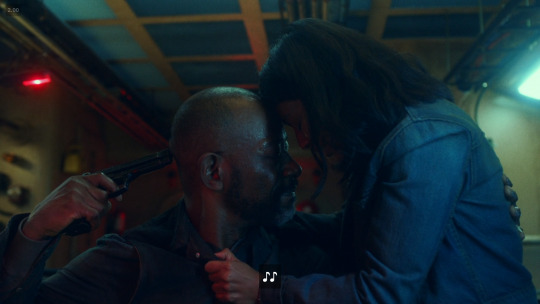
As both the group and the episode are already conveniently segmented, I’ll just use that same segmentation to talk about everything.
PROMISE ME YOU’LL FIND SOMEONE
First, we have Rachel and her daughter. I’ll admit, it took me a minute to remember who this was, but this segment is replete with symbols. She’s trying to change a flat tire and not having much luck. She hears Morgan’s message, but decides he’s wrong.
While still trying to change the tire, the car falls off the jack and onto her leg, resulting in an open fracture. (Ouch!) She splints herself with duct tape and then tries to walk with her baby girl (named Morgan). A ways down the road, she gives up, puts the baby on her back, ties herself to the dog, and then commits suicide. It’s not immediately obvious, but she knows she’ll turn and she’s hoping the baby will be safe on her back and the dog will find someone who will raise the child.
We aren’t entirely sure what the flat tire symbol foreshadows. But it we usually see it in conjunction with new information, meeting new people, or discovering a new community. We saw it somewhat with Abraham’s group in 5x05. They didn’t discover a new community, but they did discover Eugene’s lie, which changed things. The one I always think of is from 6x10 when Rick and Daryl chase Jesus after he takes off with their truck. He has to change a tire which is how they catch up to him. It leads to them discovering Hilltop for the first time. Here, what happens with Rachel does lead to new beginnings.
First, an emotional one for Morgan and Grace who will probably end up raising the baby together. (It’s fitting, both because Grace lost her baby, and because this baby is literally named after Morgan. Not to mention, the baby was born at the beginning of the season, right when Morgan was given a second chance at life). Secondly, because in this episode, the group is, for the first time, fully and openly meeting with the CRM. More on that later.
But that’s not the extent of the symbols here. The leg thing might be part of the lost foot symbolism, but more specifically it reminds me of Sam’s girlfriend in 4a who had the compass rose tattooed on her leg, and lost that leg when walkers got to her. I won’t say tons more about that right now, but this is definitely a symbol we’ve seen before.
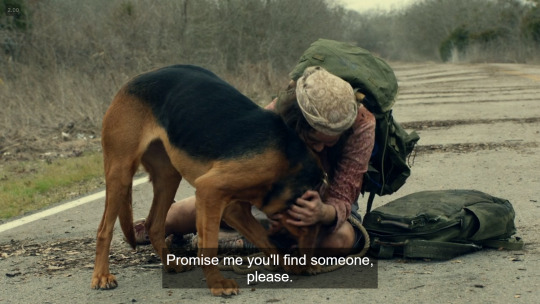
Finally, there’s the “find me” theme. She tells the dog to find someone so her baby will live. Obviously that’s big ever since the Leah episode. We can tie this directly to Daryl in that episode. But also notice that we have a baby (Child and Baby symbolism around Beth) who needs to be rescued after its parents die. And Rachel ties herself to the DOG (Sirius symbolism) who finds the larger group and saves the baby. If that doesn’t scream a foreshadow of Beth, I don’t know what will.
DAME! EL ARMA! (Translation: Give me the gun!)
Next we shift to Daniel’s group. Daniel, Lucy, Charlie, Will, Sarah, Rabbi Jacob, and Rollie are in Al’s armored truck. They’ve taken Riley prisoner. Daniel heard a voice giving coordinates telling them a safe place to go but he doesn’t trust his own mind. So, he can’t be sure of what he heard. Instead, they head toward what they think is the hotel where Alicia is being kept. Riley told them where it was. The bottom of their truck gets damaged and Sarah fixes it. The short of things are that Daniel figures out that Rollie is a traitor and shoots him. Riley charges him and Charlie shoots him. He wasn’t actually taking them to the hotel at all but was just trying to keep them running in circles. So they head to the coordinates Daniel heard on the radio.
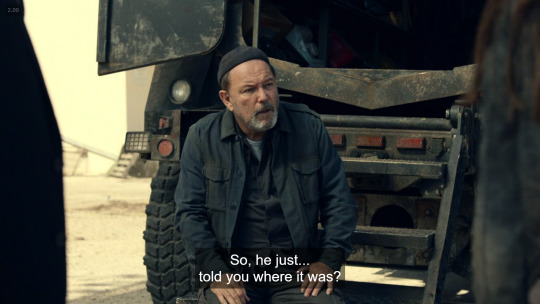
Okay, lots of great stuff here. Let’s talk Daniel. Remember before he didn’t trust his own mind. Here, the same was true. In this case, what he heard was true and was also the means to saving everyone, but because he didn’t trust himself—specifically because he’d had a weird hallucination before—he didn’t follow his instincts right away. But along the way, he picked up some betrayal and trusted himself enough to at least try for what he heard. And it paid off.
I 100% think this is a template for Daryl. His hallucination is Leah. And in the show as things are right now, it’s unclear if he knows that or not. Probably not. But at some point he’ll realize he was hallucinating and not trust his own mind anymore.
Because of that, he’ll hear something on the radio (much as Daniel did here) but not trust what he thinks he heard. I don’t know what it will be. Maybe Beth’s voice? Maybe Rick’s? It’s worth pointing out here that the voice belongs to Althea. Her and Isobel have HEAVY parallels to Beth and Daryl. We also have a situation where she left the group for a time, clearly found someone inside the CRM, and returned to save her friends/family/group. So that could possibly translate to Rick as well.
So, I understand better now why they did the whole memory thing with Daniel earlier in the season. It was partly to set up the situation in this episode, and I’m sure there will be more to this arc as we move into S7. But it’s also just a very specific template and foreshadow of things that will happen in TWD.
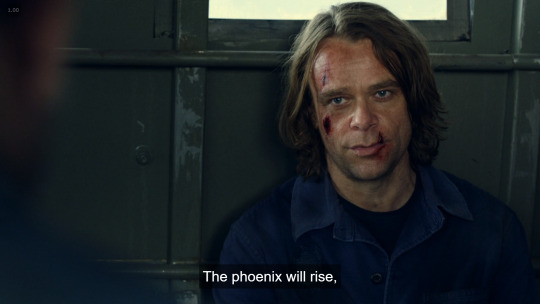
Another important thing to mention is that the word “phoenix” is mentioned twice in this scene. In fact, that’s how Daniel realizes Rollie is a traitor. I actually think he probably became suspicious earlier than that. If you watch it closely, Rollie is driving and seems to swerve to hit several walkers, which is probably what damaged the bottom of the truck. I think that made Daniel suspicious, but he couldn’t be certain Rollie did it intentionally. He might have just been driving erratically, and everyone’s nerves are really frazzled at this point.
Then Rollie gets out to kill walkers and Riley mentions the world rising like a phoenix. Rollie didn’t hear him say that because he was outside. So when Rollie says the same thing a few minutes later, Daniel realizes they’re working together and using the same terminology.
If you didn’t catch all that the first time, don’t feel bad. I watched this episode like 3x before I caught all the nuances.
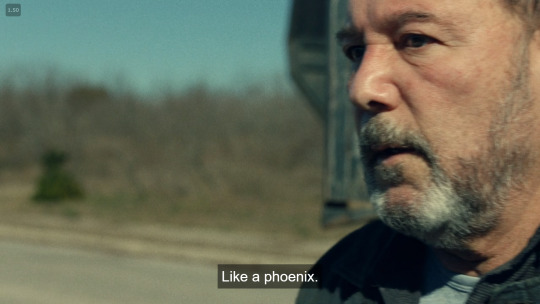
But clearly the phoenix symbol is a big deal to begin with. Phoenix = Beth, as well as a general resurrection symbol. And they’re using it here to describe the world coming back from this nuclear attack. I also think it’s probably intentional that this is how they came to realize betrayal was afoot.
And to expand that, it’s also what led them to what would actually save them. I’m not sure exactly what this points to as a template, but I’m sure it’s pointing to one. And that Beth is involved.
As a side note, I want to point out that just before they exit the truck, Sarah called Rollie Kemosabe. That’s a Lone Ranger Reference. This tiny little tidbit caught my ear, led me down a rabbit hole and to some big conclusions about the Lone Ranger symbolism we’ve seen a lot in the main show. That’s a totally different theory for another day, but I wanted to note the reference here.
Two more symbols of note in this section. Sarah hooks her welder to a car battery to get it to work. Battery theory.
Also, Riley says something about how he wants to see everyone’s faces when all their efforts to build a better world turn to ash. That got me thinking about the “ash” symbolism, the most famous use of which was in Consumed, when Daryl said, “we ain’t ashes.” We understood what he meant in context, of course. And it’s always been a potent symbol. Phoenixes rise from the ashes. And ashes are the one of the most pure substances on earth because their impurities have just been burnt away. So it was always an interesting symbol. And of course he says this WHILE he and Carol are searching for Beth.
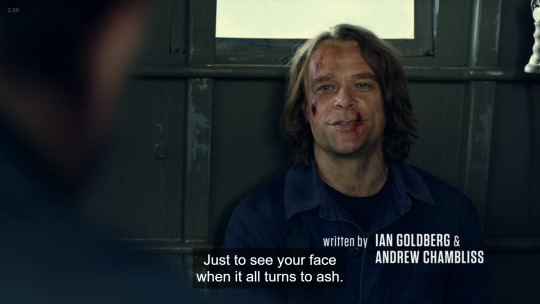
Well, in this episode, Riley equated the nuclear attack with ashes. And we (crazily) saw Dakota physically turn to ash when the blast hit. So, you could say that those who survived “ain’t ashes.” But my point is that ashes (around Beth and Grady) this nuclear storyline, and phoenixes were all equated in the same sentence. (Coincidence? I think not!)
They end up going to the coordinates, and nothing seems to be there, until a helicopter shows up. It’s not just the CRM. It’s Al and, I’m assuming, Isobel, who save them.
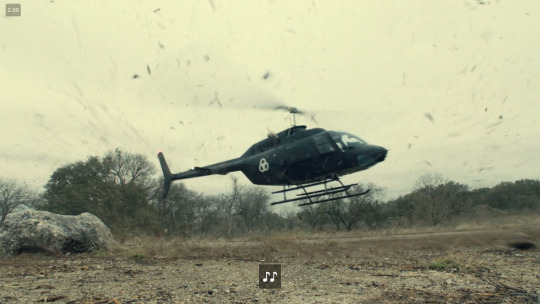
This is huge. I don’t know if Isobel has gone rogue or has the CRM’s blessing on this rescue, but either way, they’re coming face to face with the CRM, and I think that’s super important. Obviously a setup for future storylines.
ENJOY THE VIEW, ASSHOLE
Let’s move on to Sherry and Dwight. First, they’re looking for a SCHOOL. I really gotta nail down what the school means. I’m thinking maybe it represents a place that people think will be safe, or should be, but isn’t. Something along those lines. But we’ve seen them a lot, including very prominently around Father Gabriel in Coda.
In this case, they can’t find the school. They have a map but they either made a wrong turn or it just isn’t there anymore. They’re just looking for some kind of shelter from the blast.
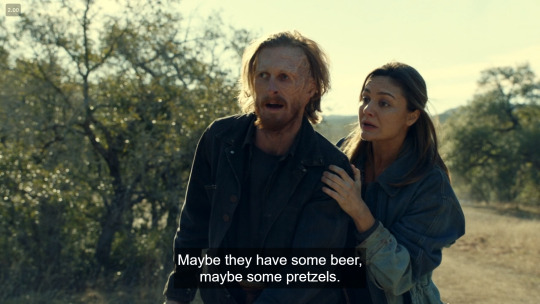
Eventually, they happen upon a cabin. On the outside, it’s very reminiscent of the moonshine shack or even Leah’s cabin. On the inside, it’s actually very nice and well kept. It reminded me of the funeral home in Alone being very clean and well kept, and Daryl saying someone had been tending to it.
Sherry says they should go in. Maybe there will be pretzels and beer. While both of those thing are clearly Dwight and Sherry symbols, and have been used extensively for their arc, they’re also well-established Bethyl symbols. Beer, cuz obviously. Pretzels are a religious symbol signifying the Trinity. But we also saw these around Richonne in 7x12. So, it’s not even JUST Bethyl, but something that’s around couples who get separated/“lose” each other, and then find each other again. No, that hasn’t happened for either Bethyl or Richonne yet, but we have ample evidence that it will. Through the Sherry/Dwight parallels if nothing else.
After Sherry suggests the cabin, Dwight says, “You serious.” Cut to me, laughing and pointing at the screen because this symbolism is SO obvious at this part.
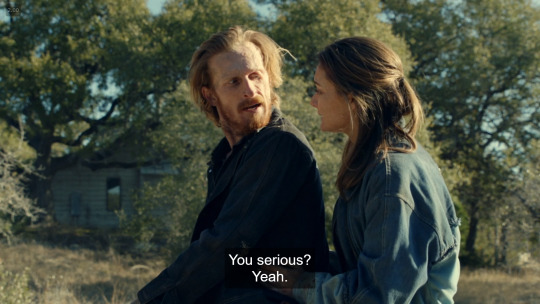
So they go into the cabin, find some beer, and have a discussion about how they wished they could have had more time together. How much time they’ve wasted apart. *coughs Bethyl*
It turns out, someone WAS tending to the cabin. A family had lived there until recently. They saw the missile go up and tried to get into their own storm shelter, but some of Teddy’s scumbag followers kicked them out. Dwight and Sherry go about getting the shelter back. They rip the doors off and when two guys come out, they kill one and badly wound the other. Dwight says they’ll leave him alive so he has a front row seat to the destruction he helped cause. This is where we get the line, as Sherry says, “Enjoy the view, Asshole.”
Dwight and Sherry go into the shelter with the family and that’s how they survive.
A few other things of note, here. Sherry’s line that heads up this section (Enjoy the view, asshole) sounded familiar to me. I was thinking we’d heard it before, but wasn’t sure when. Maybe with Negan or during AOW sometime? Then, it occurred to me. We heard something very similar from Tara in S4 when Abraham, Rosita and Eugene showed up. After killing the walkers, she saw their truck and said, “hope you enjoyed the show, assholes.”
I’m not sure exactly what the correlation is there, but it’s interesting.
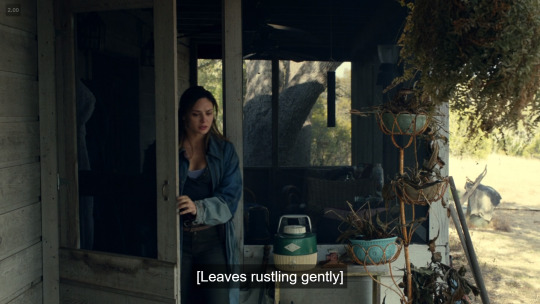
Also, when Sherry first goes into the cabin, she sees pictures of the family living there. In the pictures, the couple has a baby in their arms. When they show up, the man even calls his daughter his “baby.” But she’s actually like 8 years old. (Just a guess; they don’t tell us her exact age.) Clearly the pictures were from her birth and that was a while ago, but I had the thought that maybe it’s a hint about time passing, 8 years later, something like that.
YOU HAVE NOTHING TO BE SORRY ABOUT
Next, we move to Teddy and Dakota, driving in a truck. He takes her to the top of the ridge so they can watch the destruction when the warheads hit. She apologizes for saving Morgan, who is the one who foiled Teddy’s plans. Per the line, he tells her she has nothing to be sorry about. She also thanks him for accepting her as she is. They hug. I gotta say, it was slightly creepy and pedophilic, if you ask me.
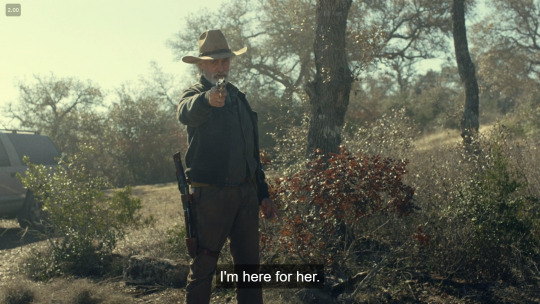
Then John, Sr. shows up. He says he isn’t there to take out Teddy so much as to save Dakota. He tries to convince her to come with him. At first, she’s completely loyal to Teddy and won’t hear of it. Teddy attempts to kill John, but June shoots the gun from his hand. She came with him and also tries to convince Dakota to come with them. They both say that they forgive her for what she did to John, and that has a huge impact on her, but not enough for her to do as they want.
When John kicks a gun away from Teddy, his boot hits metal and he realizes there’s a shelter under the place Teddy brought Dakota to. So, much like our old terrorist buddy Saddam Hussein, Teddy is utterly full of crap. He expects others to die for his cause, but he was always planning to save himself.
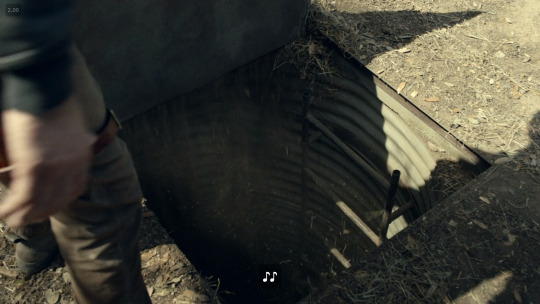
This really messes Dakota up when she realizes he’s been lying to her all along. He has to back pedal pretty hard and claims that he was only going to save himself so that when the dust settles, they can go back and set off the rest of the nukes. John figures out that Teddy doesn’t really care about Dakota. He needs her because the two keys needed to set up off the nukes are on opposite sides of the room, so they need two people to detonate them.
John and June take refuge in the shelter, but Dakota refuses to go with them. She kills Teddy (he has the nerve to look surprised) and then we see her literally turn to ash when the warhead hits. Crazy stuff.
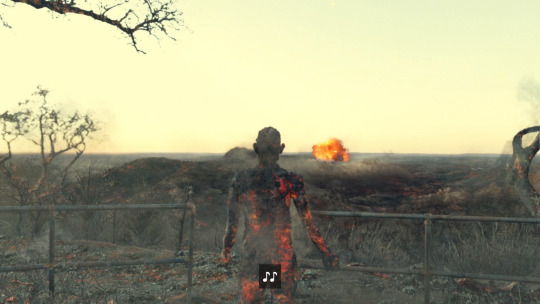
I CAN HEAR HER
Morgan and Grace are still at the sub and he’s floundering for an answer. Grace basically convinces him they should kill themselves, because she doesn’t want to have to deal with radiation poisoning again. They almost do it together, but then they hear a baby crying. She thinks it’s Athena, come to get them at the hour of their death. But, it’s an actual baby. It’s Rachel and Isaac’s baby. Morgan goes to get her and declares her a “gift from Athena.” (Let’s totally get into the Greek mythology of THAT.) Clearly he and Grace will raise this child together.
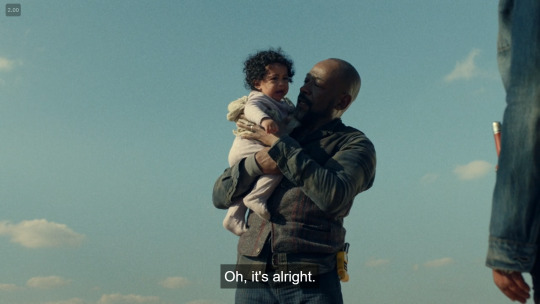
And given the Child and Baby symbolism around Beth, as I mentioned earlier, we can relate this to her. But there’s something else, something broader, that strikes me. If Rufus (the dog) = Beth, who saved the baby, well, Rufus went straight to Morgan. I’ve long wondered if maybe Morgan is the person who found Beth and either took her to Grady or nursed her back to health in some way.
I’m still not going to commit to that being the case one way or the other. Maybe, maybe not. We simply don’t know yet. But once again, with this interesting template, what I will say is that Morgan is mixed up in Beth’s arc somehow. And with Daniel’s group coming into direct contact with the CRM, I think there’s a very good chance Morgan and Beth could meet soon.
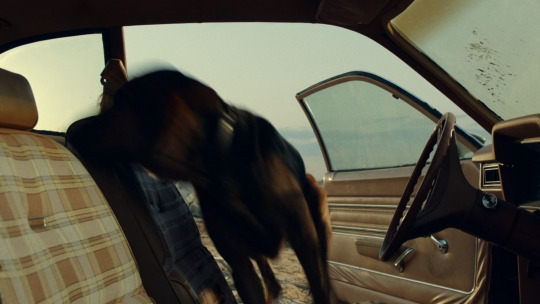
The only other thing of note in this section is that before the bomb hits, Morgan, Grace, and Baby Morgan take shelter under a semi truck. We actually see Rufus jump into a car with it’s back door open. We don’t see the dog again, but I’m gonna go out on a limb and say he survives. The car with the back door open is a direct callback to this. I.e. Beth’s survival.
WHAT MAN ARE YOU?
Strand’s section is kinda the big cheese here, and I’m doing it out of order because of that. Strand’s scenes here reminded me of 5x06, Consumed, and then Grady itself. And Consumed was leading to Grady, so it all amounts to the same thing. It’s about Beth’s S5 arc. The symbolism here is HUGE. Yes, even huger than Dwight and Sherry’s cabin.
Let me just illustrate how it’s like Consumed and Coda.
1) Strand rides into a city and under an overpass. In 5x06, Daryl and Carol drive a van off an overpass. Also note the yellow scaffolding in the background.
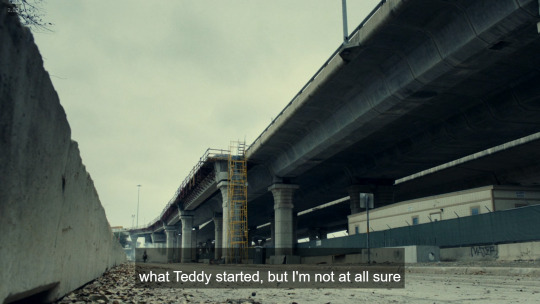
2) He goes into a high rise (sort of ) office building, which also reminds me of Chokepoint, but that, with it’s elevator shaft, also pointed back to Atlanta. Daryl and Carol spent the night in the shelter, the interior of which looks a lot like this building Strand is in. They then went into the high rise office building and that’s when they saw the Grady van on the overpass.
3) In general, we see a lot of parking lots and building with walkers in them, same as Consumed.
4) Strand finds some indoor campers. Corpses in sleeping bags with tents strewn around. Daryl and Carol found the same thing in Consumed.
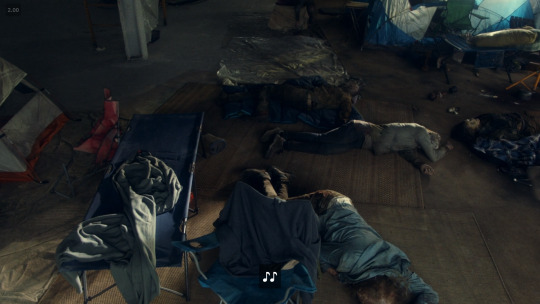
5) Eventually Strand makes it up into a part of the building that is either a parking garage or at least unfinished, as the walls, ceilings and floors are made of concrete. Daryl and Carol went through several parking garages in Consumed. In fact, right after they saw the indoor campers and Noah took their weapons, they were in one. That’s when we see Daryl drop the book about childhood abuse. So the sequence is even chronologically the same.
6) Strand sees a walker (dead, not animated) wearing a cop uniform. The camera focuses on it twice for about 5 seconds each. Clearly, we’re meant to notice this walker. A callback to Grady.
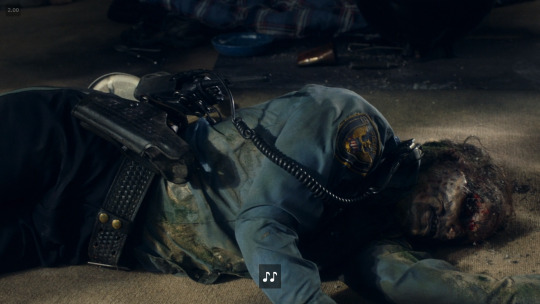
7) He meets a man living in the structure (Howard) who has TONS of paintings, and wears glasses. The reason I mention the glasses is that I had a moment where I really thought this might turn out to be Doctor Edwards. It wasn’t, but they hid the guy’s face for a while, he wore glasses, and he had PAINTINGS. Tons of paintings. (Remember, Edwards had the one of Peter.)
Now, I could say a LOT about these paintings, but I’ll save most of it for other theories later in the week. Just know that many of them look colonial, and they support the Revolutionary War (and some other wars around the same time) templates that we’re now recognizing.
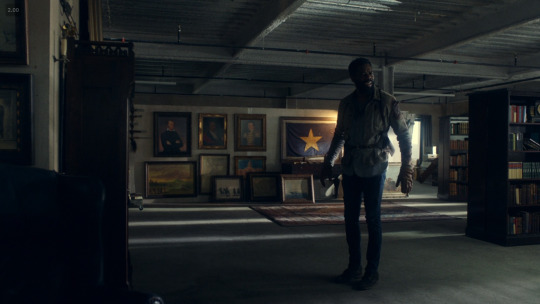
The line, “what man are you” applies to Strand telling Howard he’s Morgan. It made me think of episode 9x06, Who Are You Now. It kind of refers to choosing who you want to be in the wake of disaster and tragedy. And that was definitely a theme Beth brought up at Grady when she told Dawn, “this is who you are, until the end.”
Strand and his new friend ultimately survive. Either they aren’t close enough to the blast or it’s just not big enough to take out the building they’re in, so they both live. But they were both clearly prepared for these to be their last moments. Now take a look at what Strand says when he realizes he won’t die. If this is meant to be his Grady, tell me these words can’t apply to Beth:
Howard: Why are you laughing?
Strand: Because I’m alive. After everything I did, I’m still here.
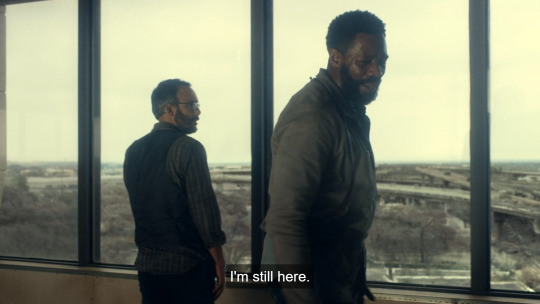
Obviously, the “I’m alive” applies. But more to the point, this is a situation that Strand expected to die in, but he didn’t. And the “I’m still here?” That isn’t just a symbol, folks. Beth literally said that to Carol at Grady. Coupled with everything else, especially the cop walker, that’s pretty compelling.
He then goes on to talk about how he’s a survivor and has to rebuild who he is several times. *coughs Beth* He says they can now rebuild the world with art (Beth and Edwards), books (all the book/library symbolism we’ve seen), music (Beth) and good bourbon (alcohol = Bethyl).
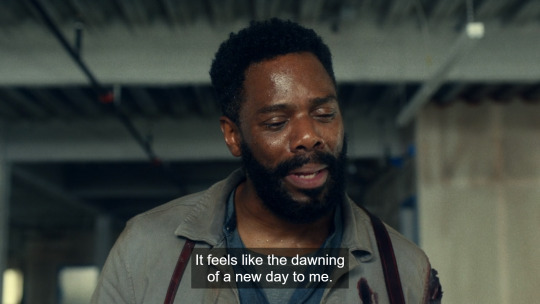
Then he says, “it’s the dawning of a new day.” Guys, that theme has been literally hanging around in the background since 4x01 at the prison. This is what they’ve been pointing to and looking toward since Gimple took over in 3x16/4x01.
I KNOW HOW TO SURVIVE
Strand says this, but we actually see it as a section heading before we see how EVERYONE ends and survives. When I realized that, it occurred to me that each of these lines that serve as section headings are about surviving somehow. About how someone in the group ended up circumventing death.
“Promise me you’ll find someone” was about Rachel made sure her baby survived. “Give me the gun” (in Spanish) was Daniel figuring out Rollie’s deception and getting his group to the CRM coordinates so they lived. “Enjoy the view, Asshole” was Dwight and Sherry getting the family’s shelter back, which was how they survived as well. “You have nothing to be sorry for” is a little different. They were talking about Dakota saving Morgan at the beginning of the season. So it might be geared toward his survival. But I also think the world at large will survive without Teddy and Dakota around, and this also led to their demise. “What kind of man are you” was about Strand doing what he had to, even despicable things, in order to survive. And then of course the last and obvious one, “I know how to survive.”
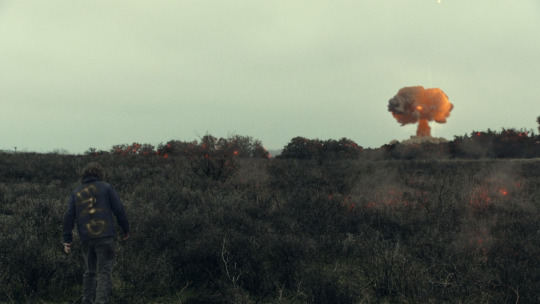
So, in the end, most of main characters survived. The only deaths were Teddy, Riley, Rollie, and Dakota. The rest managed to find shelter. They’ll all be dealing with radiation sickness for sure, so it will be interesting to see how they handle that next season.
My final, bird’s eye view takeaway is this: much like TWD 10x18, Find Me, I think each of these story lines represent parts of Beth’s arc in some way. Some past. Some future. Maybe in some cases, both at the same time.
Rachel at the beginning may represent the fall of the prison, but also future arcs for Beth. The cabin clearly is a callback to Still and Alone. As I discussed, Strand’s part is a callback to Grady/Atlanta. The Daniel stuff represents future Daryl searching for Beth. (Notice how they end up with the CRM, and in 10x21, we saw the same thing symbolized for Daryl when he came across those army walkers.) And even Teddy and Dakota’s bit represent the demise of the bad guys, while the good guys (John, Sr. and June in that case) survived somehow.

So this was a super-cool episode. Very symmetrical in it’s symbolism and a great end to a very epic season. In truth, other than John dying (which SUCKED) the back half of Fear S2 has really been stellar. And that’s mostly because it’s lining up perfectly with all the things we’ve been theorizing for quite a while. Which of course makes me happy.
What did everyone else think of the finale?
#beth greene#beth greene lives#beth is alive#beth is coming#td theory#td theories#team delusional#team defiance#beth is almost here#bethyl
7 notes
·
View notes
Text
August 21: my kaddish month
I’ve sent this to a number of people, but I’m putting it here too in case some readers who might be interested will stumble across it:
A little more than a month has passed since Cindy died, and I get asked a lot how I’m doing. My standard answer starts with a couple ways of framing:
--- the earthquake is over, but there are lots of unpredictable emotional aftershocks
--- I’m past the Shock & Numbness phase, but normal life doesn’t seem normal. Lots of How Can This Be Real moments that can be disorienting and distressing
--- many times emotions collide: how much to lean into or away from grief, how to feel it’s OK to feel OK when I do, how keep her with me and move forward too, etc
I suppose at some point a fascination with grief can start to make others uncomfortable, but grieving has a logic of its own. One key part of “after” life was the 30 days of daily religious services I attended to honor her memory. I found the routine and --- surprisingly, the ritual --- spiritually nourishing. Cindy’s eyebrows always shot up at the word “spiritual.” Usually mine too. I hope those of you I send these four pages to don’t find it too tedious Perhaps it’s a way of keeping Cindy in your thoughts and hearts too…
I am a most unlikely daily mourning ritual observer. I didn’t do it for my father, and he asked us not to. But the ritual mourning prayers and the place where I’d be doing it meant a lot to Cindy, so I just committed without much deliberation. One problem in writing about a fairly traditional type of observance is that the spectrum of Jewish religious practice can be mystifying, even to many Jews. So how explain it to outsiders? I’ve tried to do it without being either too reverent or irreverent.
One basic mourning commitment is to say “kaddish”, the mourner’s prayer, for a set amount of time. Jewish practice and custom is intellectually intricate and often arcane; there are rules and exceptions to rules and different interpretations of rules, etc. There are other customs/demands for remembrance too. Many think of saying kaddish as a year long commitment. Plus yearly anniversaries, set to a moving Hebrew calendar --- just to add to the degree of difficulty. But even the year thing has permutations: actual practice for some groups is 11 months, not 12.
Why?. Different interpreters and communities make their own choices on duration. Our ritual director says “eleven.” Basically, some 13th century source says that “the wicked in Gehinom took 12 months for their souls to reach the highest levels of heaven.” But most Jews don’t even believe in a physical heaven!? Never mind. So, the reasoning goes, if the wicked took 12 months, we’ll mourn for 11: because our beloved Was Not Wicked. Welcome to Talmudic reasoning. But, traditionally, the year(ish) is for parents and children. For spouses the allotted time is 30 days. Though many people today may just do a year for anyone in the family. Thirty struck me as the perfect amount for the act to stay meaningful, helpful and not something I would treat as an increasingly resented chore.
It’s not a prayer that religious custom allows you to say by yourself. You need a minyan (quorum) of 10. It used to be men, but now men or women, at least at our conservative temple (shul, synagogue, whatever --- more insider confusing terminology). But some do say it by themselves for the comfort it brings if finding a group is too arduous. And I cheated a couple days by joining the group virtually. But I found being with a gathering of supporters did matter to me. I could have gone to a shorter evening service to do this, but preferred the morning time. And came to think a 40ish minute observance time a good block to have meaningful daily impact.
And then there’s the prayer itself. I realized right away that the weekday morning prayer service had many different kaddishs, similar prayers of thanks for and praise to a divine entity. But there’s one specific mourner’s version, said 3 times in oour short 40ish minute service. Twice, almost in succession at the end --- overkill or emphasis, depending on your point of view. Why the repeats? Haven’t pursued that yet. And, as some of you know, the prayer for the dead doesn’t mention dying or losing loved ones or honoring their memory, etc. It just profusely praises God (and lots of different words or phrases to refer to such entity since he/she/it is too holy and all powerful to mention the Real Name). Some phrases: “May god’s name be exalted and hallowed, his sovereignty soon accepted… glorified, celebrated, lauded, worshiped, exalted, honored, extolled and acclaimed… Lots of current Jewish religious practice incorporates the Middle Ages wholesale. Or earlier. Read the English on the facing page of the prayer book and much of the service sounds like the practice of a small, threatened tribe huddling in the desert thousands of years ago.
There’s a lot about Jewish practice that seems natural and essential to practitioners but might alienate the uninitiated. Or reluctant observers like me. The head coverings. The shoulder covering prayer shawls. The standing for this (many do: why not all??!), turning right for that, covering eyes for this line, fingering prayer shawl strings (tzitzit) for that. Whew. So many prayers and practices for so many different occasions. Designed, I’ve thought, to cement the devotion of believers. But it repel skeptics, too, I surmise.
One such example: in these early services most men put on tefillin. Leather straps with little black boxes attached (a prayer inside) that have very specific wrapping/unwrapping procedures for arms and head. It’s deeply moving to believers, but I’ve always thought it look repellent or ridiculous. Way too much like the garb of the ultra orthodox “crazies.” There are lots of I’ll do this/not that decisions in religious practice. I understand there’s a tenuous dynamic that exists between any minority and majority community, and clinging to tradition and being true to oneself can seem preferable to “selling out” to fit in. But sometimes it strikes us skeptics as more a clinging to “guns and religion” type intransigence.
So, if you walked in on these services cold (I was lukewarm), there’s lots that would be pretty mystifying and potentially off-putting. How could you possibly fit in? In fact, I believe I was the only new guy or gal over my month. And there had to be a decent number of temple members who have lost family members during the time I attended. Seemingly no person younger than I was doing the morning kaddish thing. And usually I was the only or 1 of 2 who didn’t put on tefillin. Men. Women usually don’t. Though one of our female rabbis did. Good for her, though I wasn’t tempted to follow.
I could fit in and feel comfortable at these services because a) I knew people there b) I was committed to being there and c) people took care of me. I no longer bristled at the imputation (real or just in my head?) that I’m a Bad Jew and I need instruction to be a Good One. This time I felt many there had cherished Cindy, understood why I was there, and quietly welcomed me. I was willing to look/be ignorant and accept guidance.
It was reassuring to see many of Cindy’s compatriots from the temple sisterhood there day after day too. The whole group (20 to 40 most days) was interesting to observe: lots more joking and side conversations during the service than I’d imagined. And there was the guy older than I who usually wore cycling shorts and shirt, the much older guy who sat to my right who usually shuffled in 15 minutes late, etc etc. Lots of accomplished people and interesting stories for another writer’s version. And --- most days --- someone called out the pages so I had some sense where we were.
I can read Hebrew if I already know the prayer or chant. So I can’t really read Hebrew anymore. Much of the service is praising God’s amazing powers, thanking him for singling out and helping Jews (don’t let anti-Semites see this!), an intricate mix of different intricate sections that over days start to fit a pattern. There are a always some bits in any prayer book that I find edifying and worth recalling; often I’m reading in one place when the service is in another. My favorite in this one:
Rabbi Schuel ben Nahmani said: We find that the Holy One created everything in the world; only falsehood and exaggeration were not God’s doing. People devised those on their own.
There’s no sermon on any days, just the chanting. And different melodies for different sections. And torah reading ritual (I could spend pages on this alone) Monday and Thursday. I still have to learn why those days. I preferred the shorter days without.
I was most fortunate to have a long time neighbor and, like Cindy, long time temple leader who I was delighted to learn (only some 30 some years later) is a regular attendee of daily morning services. Like Cindy, he has the ability I don’t to take what’s worthwhile in religious practice and ignore the rest. He credits Cindy with his reading the new alternate section of one prayer praising the Patriarchs (Abraham, Isaac, Jacob) by adding Matriarchs too.
It’s not supposed to be used at this particular service, but a couple women who led services on a rotating schedule snuck it in. Much to my friend Rick’s and my glee. He joked about wanting to write: Minyan, the Musical. Have to decide how reverent or irreverent to be I replied. Yes he said, and some would love it, some hate it. Like so much else in life, I thought.
There’s way more I could describe: the various “honors” during torah reading for one. Early on I got congratulated for pulling the strings to open the torah ark/cabinet. Basically, the only task our ritual director could be sure at that point I wouldn’t flub. One more key detail: I was wearing Cindy remarkable hand knit prayer shawl. Which, of course, many of her friends recognized. Once I made the mistake when taking it off at the service end of holding it to my face: way too emotional to repeat daily. Much more detail I could include, but there’s likely already too much. Ask me if you want more.
I was asked to say a few words on the last day, right before the concluding prayers. I told people I was a most unlikely minyan attendee, etc. Grateful for this and that person’s help and Rebbe Rick’s (joke) guidance and company. Uplifted seeing Cindy’s sisterhood comrades, etc. Hoped in coming months to find an enduring way to honor her memory, etc.
My one specific observation: I had been hearing people recite kaddish at Saturday services off and on for over 60 years. But I’d never given a thought to the brief parts where the congregation joins in on a quick line. Just part of the practice I’d heard without really hearing. Until I was the mourner. Then, on many days when the congregation joined in…
Y’he sh’meh rabbvo m’orach l’olam ulolmey olmayo…
…on many days I felt my heart lifting and a wave of emotional support wash over me. This is why you should say kaddish in a minyan if at all possible. Or I hope in your tradition or life there’s some equivalent thing to bring you comfort when/if you need it. Em and I have been lighting candles at a set time each week also. That works for us too.
The morning group skews old. But I hope that such a group is always there for anyone who needs it. I don’t want to attend any religious services daily. Or weekly. But this is my favorite service. I’ll be back. But on a day they don’t read torah. Forty minutes is plenty.
I decided, too, that on day 30, I would take off my wedding ring. I sensed that if I didn’t tie that act to a ritual I might have a hard time doing it.
6 notes
·
View notes
Note
May I ask about something I’ve read regarding Miriam? Is it true that she made a racist remark against Tzipporah, and that’s why she wasn’t allowed into the Promised Land? I could be totally misunderstanding something, but I do remember reading that. Thank you!
I hope you're prepared for a 2000 word answer, because this is a complicated question about a difficult passage. Content warnings for violence, non-explicit discussions of sex, and (maybe) racism.
The incident you're talking about happens in Numbers/Bamidbar 12. Here's what the text says, quoting from the translation by Everett Fox, skipping over some verses that aren’t relevant to the question, and anglicizing Fox’s spellings of names for clarity:
12:1 “Now Miriam spoke, and Aaron, against Moses on account of the Cushite wife that he had taken in marriage, for a Cushite wife he had taken.
12:2 They said: ‘Is it only, solely through Moses that YHWH speaks? Is it not also through us that he speaks?’ And YHWH heard.
12:5 And YHWH descended in a column of cloud and stood at the entrance to the Tent; he called out: ‘Aaron and Miriam!’ and the two of them went out.
12:10 When the cloud turned away from above the Tent, here: Miriam has tzaraat like snow!”
Tzaraat is usually translated as leprosy, but this is a bad translation. What you need to know is that tzaraat is an affliction sometimes caused by angering G-d and, as in this case, it can turn a person’s skin white.
If you're not confused yet, you should be, because this passage gives a lot of confusing information. Why is Moses's wife referred to as a Cushite, when before Tzipporah was called a Midianite? Why is Miriam punished while Aaron isn't? What was their problem with the "Cushite wife" in the first place? Why does the text say that Aaron and Miriam were speaking about Moses's wife, but then the rest of their dialogue is about their roles as prophets?
I'm breaking this down into a series of questions and explanations for better readability.
Question 1: Is the Cushite woman Tzipporah?

You'll notice that the "Cushite wife" isn't named. So the first question we have to answer is, are Miriam and Aaron even talking about Tzipporah? Or has Moses married another woman? (Polygamy would have been fairly normal in this place and time.)
Previously, Tzipporah was described as a Midianite, which would suggest that this is a different woman. However, today we don't know exactly where Midian was. We're not even sure that it was a place; it might have referred to a collection of tribes instead. "Cush" is generally assumed to mean modern Ethiopia, but that's not totally clear either.
It's possible that there was some overlap between Cush and Midian. Maybe the Midianites were a tribe of people living in Cush, or maybe Midian was an area in the larger territory of Cush. This might be the Bronze Age equivalent of saying "Tzipporah was from Texas" and then later saying "Tzipporah was from Houston."
Most Torah commentaries agree that this person is Tzipporah and that’s my interpretation too. For ease of discussion, I will continue referring to her as Tzipporah.
Question 2: Were Aaron and Miriam equally at fault for this situation?
In your question, you mentioned reading that it was Miriam who "made a racist remark," but as you'll notice from the passage, both Miriam and Aaron spoke. What you would miss if you only read this text in English, however, is that in Hebrew, verbs are gendered. In this case, the verb for "spoke" is gendered feminine. Normally, if you were referring to something done by both a woman and a man, you would use the masculine form of the verb.
Why doesn't that happen here? One traditional explanation is that it was Miriam who initiated the discussion. She went to Aaron first and persuaded him to join her in her complaint. Aaron has a history of acceding to what others want (see: the thing with the Golden Calf), which I think is very Hufflepuff of him. Meanwhile, Miriam has a history of taking leadership and persuading others to go along with her plans (see: convincing Pharaoh's daughter to adopt Moses, or leading the Hebrew women in a song of victory after crossing the Red Sea). So this explanation is perfectly in character. Either only Miriam said the part about Tzipporah, or both Aaron and Miriam said it, but Miriam was the instigator. A more fun explanation is that Aaron is trans and prefers feminine pronouns, but I don't know of any other passages that support that reading and in any case, that would be a subject for a different post.

Question 3: Was this about race?
First off, I'll point out that no one in this story would be considered white today. Miriam, Aaron and Moses would be considered Mizrahi Jewish or Middle Eastern by today's standards, while Tzipporah would be considered... well, again, we don't know where Midian was, but Middle Eastern, Ethiopian, or specifically Beta Israel would all be valid modern guesses.
That said, racism can absolutely exist between different people of color. Midianites and Hebrews would have seen each other as different people, if not different races. And there are lots of examples of violence flaring up between those two groups. In Genesis/Bereshit 37:28, Midianites enslave the young Joseph. In Numbers/Bamidbar 31, the Israelites launch a war against the Midianites. In a particularly violent scene from Numbers/Bamidbar 25:8, a Midianite woman and an Israelite man are killed for sleeping together.
So, it's totally plausible that Miriam was being racist. This would explain why Tzipporah’s race is highlighted twice with the repetition of the phrase “Cushite wife.” It would also explain why G-d chooses to punish Miriam specifically with tzaraat. The affliction is described as making her skin look "like snow," i.e. unnaturally white. This might be G-d's way of saying, "You think skin color matters so much? Okay. Let's see how you feel about your skin color now." Rabbi Rick Jacobs interprets the story this way, and has a very good talk about it in this podcast episode.
However, racism isn't the only explanation for what's going on here.
Question 4: Why the abrupt change of subject halfway through the complaint?
As I mentioned above, the text at first says that Miriam was speaking "on account of the Cushite wife." But then the very next line from her and Aaron is, "Is it only, solely through Moses that YHWH speaks? Is it not also through us that he speaks?” Which is a total non-sequitur. Imagine saying to your sibling, "I hate your girlfriend, and also, you’re not that special. Dad gives us special treatment too."
One explanation is that the real issue all along was the issue of leadership. Jenna Reback on an episode of the podcast Bad Jew Weekly says, “The ostensible reason that Miriam and Aaron had for talking badly about Moses wasn’t actually the root of their problem… They’re like, “Ugh, he married this Cushite woman.” And then they really get into what’s actually bothering them, which is that they should be more celebrated by people and by G-d because G-d has spoken to them too. In a way, I think this is one of the reasons that G-d is so mad at them, because they don’t actually just level their complaint… Miriam and Aaron are kind of being surreptitious and saying one thing but meaning another and talking behind closed doors…Miriam and Aaron don’t have the guts to just say it outright.”
In this reading, Miriam at first tries to hide her true intentions, possibly out of shame, or possibly to delegitimize Moses ("How can he lead us when he didn't marry a woman from our people!") before admitting to her real problem. This would explain why her punishment from G-d is harsher. Not only did she criticize her brother; she wasn't even upfront about what her criticism was!
But there's another explanation that ties these two threads together. According to commentary from Chizkuni and Rashi, Miriam spoke "on account of the Cushite wife" not to disparage her, but to help her. They interpret the repetition of “wife” to mean that while Tzipporah was being a good wife, Moses was not being a good husband. He had become too wrapped up in the responsibility of leading his people and stopped paying attention to Tzipporah. From Chizkuni’s commentary: “’Miriam and Aaron spoke out critically against Moses;’ how did either of them know that Moses had separated from his wife? They had both noted that Tzipporah no longer wore the jewelry she had been in the habit of wearing. Miriam asked Tzipporah why she no longer wore that jewelry. Tzipporah replied that it was because Miriam’s brother (Moses) did not pay any attention to her jewelry. This was a hint that he had separated from her. She told Aaron about this and they talked about that situation criticizing him.”
I should point out that the language used here is euphemistic; the implication of “separated” is that Moses and Tzipporah were no longer having sex. Tzipporah was upset about this, and Miriam was angry on her behalf. It’s kind of like that one scene in Brooklyn 99.

Let’s revisit the line, “Is it not also through us that he speaks?” According to Exodus/Shemot 6:23, Aaron was married to Elisheva. No spouse is named for Miriam in the Torah, but one midrashic tradition says that she married Caleb, a man introduced in Numbers/Bamidbar 13:6. I’ll come back to him, but for now let’s think about this setup. All three siblings are prophets. All three are married. But unlike Moses, Miriam and Aaron have remained close with their spouses, despite the challenges of leading their people. That’s why they make this point. This isn’t a challenge to Moses’s leadership; it’s a reminder that fulfilling G-d’s wishes is no excuse for neglecting human relationships.
This explanation seems random, I know. Where are Rashi and Chizkuni getting this backstory from? Turns out, there's a story about Miriam intervening in a similar situation between a wife and a husband. According to Rashi, back in Egypt when Pharaoh gave the "kill all the baby Hebrew boys" order and before baby Moses was born, Yocheved's husband Amram divorced her. Amram's argument was that if all baby boys were going to be murdered, there was no point in having more children, and therefore no point in being married. How Yocheved felt about this isn't elaborated on.
Miriam, however, was ready to fight. Rav Chanina says that Miriam “told her father: ‘Father, your decree is harsher than that of Pharaoh! He only decreed against the males, but you have decreed against both the males and the females. It is doubtful whether the decree of the wicked Pharaoh will come to pass, but you are righteous, and so your decree will be fulfilled.’ Amram immediately took back his wife.”
Keep in mind, most commentary says Miriam was only six at the time. Please picture a tiny, furious six year old girl standing up to her father and refusing to let him break their family apart. This is why I love Miriam.
Anyways, that story sets a precedent that A) Miriam is willing to intervene in extremely personal matters if she thinks it's for a good reason and B) when there’s a dispute between a husband and wife, Miriam intervenes on the wife's side. Feminist solidarity FTW.
Recap: I know that was a lot of information, so in summary, here are three possible explanations for what happens in this section.
1) Miriam spoke against Tzipporah and Moses because she was being racist about Tzipporah.
2) Miriam and Aaron resented not getting a bigger leadership role, but rather than admitting this directly, Miriam initially pretended that their problem with Moses was that he had married Tzipporah.
3) Moses was neglecting Tzipporah and Miriam tried to talk to Moses on her behalf.
Addendum: In your question, you asked if Miriam "wasn't allowed into the Promised Land" because of this incident, and at first, I was going to say no. In Numbers/Bamidbar 14:27-14:35, G-d states that because the Hebrews will not stop bickering amongst themselves and doubting their G-d, they will wander for another forty years. The generation that was enslaved in Egypt will not set foot in the Promised Land, but their children will. I always assumed Miriam was included in the category of the generation from Egypt.
However! There are three exceptions to G-d's pronouncement. One is Joshua, who doesn't matter for this discussion.

The other is Moses because G-d plays favorites. And the third person is Caleb.
Remember the midrash I mentioned earlier about Caleb being Miriam’s husband? Well, if we take that as true, that implies that Miriam would have been allowed to enter the Promised Land with him. Especially since the other exception to G-d’s declaration is Moses, her brother. They’re supposed to settle in the land and raise families who will never have to suffer under slavery. Doesn’t make much sense for G-d to deliberately break up a family.
But let’s go back to Moses. Because guess what? He messes up. In Numbers/Bamidbar 20, G-d instructs Moses to summon water from a boulder by speaking to it. Instead, Moses strikes the boulder with his staff. G-d’s response is, “Because you did not have trust in me … you shall not bring this assembly into the land that I am giving them!” And with that, Moses is barred from entering the Promised Land.
From this we know that G-d can and will revoke Promised Land privileges for certain offenses. The incident with Tzipporah may have been one such offense. Maybe that is why Miriam doesn’t make it to the Promised Land, and why she is the first of her siblings to die.
There’s a lot that I didn’t cover. Sefaria lists 77 commentaries just on the first sentence of Numbers/Bamidbar 12. If you want to read more about this passage, I’ve linked some of my sources in the post and listed two others below.
Miriam in the Desert with Alicia Jo Rabins: a video discussing, among other things, popular interpretations of Numbers/Bamidbar 12
Sefaria: an all-purpose encyclopedia of Jewish texts and commentary
178 notes
·
View notes
Photo
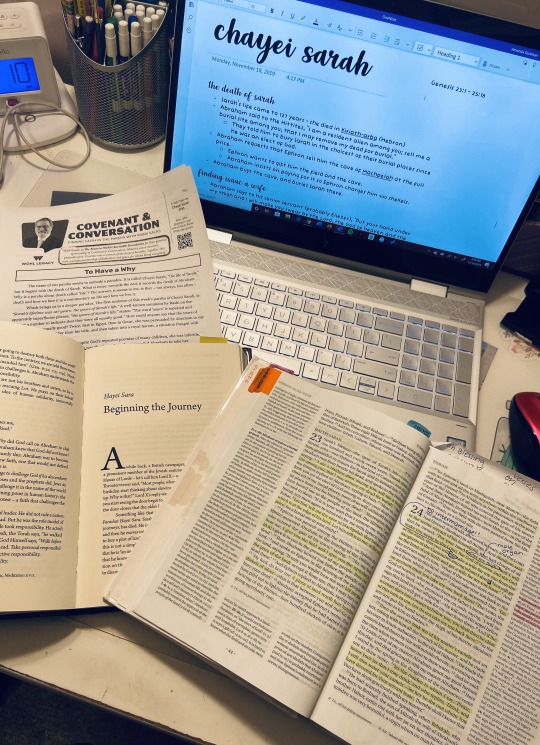
Long time no post!
This week’s Torah portion is Chayei Sarah. In this portion our beloved Sarah dies, Abraham buys the cave of Machpelah to bury her in, a servant finds Rebecca as a wife for Isaac, and Abraham dies. Lots of happenings!
In addition to reading the week’s portion in my Jewish Study Bible (JPS translation), I like to read some commentaries. I read a chapter of Lessons in Leadership by Rabbi Jonathan Sacks every week. Each chapter is only a few pages and offers a lesson on how to be a good leader. Rabbi Sacks points out both the good and bad qualities of our biblical ancestors and turns them into lessons on how we should act. It’s a very easy read and very informative!
I also read Rabbi Sacks’ Covenant and Conversation every week and listen to its accompanying podcast. I have found them to be particularly inspirational and engaging. I highly recommend checking out Covenant and Conversation!
Other podcasts that comment on the weekly parsha that I recommend are On the Other Hand (10 Minutes of Torah with Rabbi Rick Jacobs of the Union for Reform Judaism), Pardes from Jerusalem, and JTS Torah Commentary. These podcasts provide a spectrum of outlooks - ranging from Reform to Orthodox. They are all very interesting and usually don’t provide the same lessons - so you learn a lot!
In addition to all of this, I also like to look in the local Jewish newspaper for the week’s d’var Torah, listen to my rabbi’s sermon for the week, and attend Torah Study at my synagogue (although at Torah Study we read the Torah chronologically, we do not focus on the week’s Torah portion, we just continue where we left off).
It’s really great to get information from a wide variety of sources and outlets. Even better is discussing it with others! I am SO open to having a chevrutah with someone on here. If you are interested please do not hesitate to reach out to me!
16 notes
·
View notes
Text
Rabbi Rick Jacobs: *talks about not taking stories from the Bible literally*
Me:

#the life of a former mormon converting to judaism who suffers from mild Christianity related trauma#lololol
4 notes
·
View notes
Quote
Although one can certainly love Torah and follow different political paths, one cannot claim to be a lover of Torah and not care about how our society treats those in need, the weak, the vulnerable, the stranger and the oppressed. Sermons that “speak up” on the great moral issues of our world and our lives may address politics and policy as a means of addressing such moral issues but they are not about politics. On the contrary, they are about our Jewish values; the values we teach and the values we pass on to our children; the values that have kept us together as a people for centuries.
Rabbi Rick Jacobs
231 notes
·
View notes
Link
New York, NY; October 27, 2018 - The slaughter of our brothers and sisters praying in their holy synagogue this Shabbat in Pittsburgh breaks our collective heart.
The murders took place during a prayer service in the Tree of Life congregation where, like synagogues all around the world, they were reading from Genesis recounting how Abraham welcomed perfect strangers into his tent. How painful and ironic that we live in a time when we have to temper our loving welcome of strangers as we protect our communities from violence and hate.
There is much which is unknown about today’s horrific killings. We will learn more over the next hours and days. We will continue to work with our nation’s synagogues and other houses of worship and law enforcement to enhance security and provide effective protections for our communities – and our nation.
This time the Jewish community was targeted, in what may be the worst anti-Semitic attack in American history. Other times it has been African-Americans. Or Sikhs. Or Muslims. Or members of the LGBTQ community. Or too many others. What we know is this: the fabric holding our nation together is fraying. It is our task to ensure that it does not come apart.
We mourn as one people along with all people of conscience.
#tree of life congregation#antisemitism#anti-semitism#conservative judaism#xenaphobia#anti jewish hate#antisemitism in america#rick jacobs#rabbi rick jacobs#union for reform judaism
54 notes
·
View notes
Text
Jonathan Pollard is a Litmus Test. But for What?
The arrival of Jonathan Pollard in Israel 35 years after his arrest for espionage on Israel’s behalf has made me think about the position of the Jew in the diaspora, particularly in America.
There are facts about Pollard’s case that are shrouded in mystery (for example, the still-secret Caspar Weinberger memo that in part convinced the judge in his case, Aubrey Robinson, to abrogate his plea bargain and sentence him to life imprisonment).
There is very little impartial material written about his case. Did he do what he did out of Zionist motives or did he do it for the money (or both)? Was Judge Robinson influenced by accusations that Pollard had aided the apartheid South African regime? These questions are discussed here (from a pro-Pollard perspective). Was the sentence outrageously unfair or, as some say, was it too light? Was his sentence, like the one given to Julius and Ethel Rosenberg, intended as a warning to disloyal ‘cosmopolitan’ Jews? It is possible to find documentation of various degrees of trustworthiness to support disparate narratives.
It is certain that Pollard provided a great deal of useful information to Israel about her regional enemies that had been withheld by the US. It is also certain that Pollard was abandoned by Israel, expelled from the embassy in Washington where he sought asylum, into the arms of the FBI. And it is certain that he received the harshest sentence by far ever handed down to someone for spying for an American ally, harsher yet than what some who spied for the Soviets received.
Early Wednesday morning, Pollard was met at the airport by PM Netanyahu, who said the shehecheyanu with him and personally handed him his Israeli identity document. This of course immediately made him a political football in Israel, to the extent that he wasn’t already. But that’s not what I want to discuss.
What interests me today is the attitudes of American Jews toward Pollard, and what that tells us about how they see themselves and their position as diaspora Jews.
The diaspora has generally not been a friendly place for Jews since their expulsion from Judea after the defeat of the Bar Kochba revolt by the Romans on Tisha b’Av, 135 CE. Always outsiders, they were often exploited, expelled, oppressed, and even exterminated by their hosts. But – especially between the end of WWII and the beginning of the 21st century – the USA has been different. Although there are examples of anti-Jewish riots and lynchings, and discrimination in employment, education, and residence, the position of Jews in America for a long period has probably been as good as or better than anywhere else in the diaspora.
Like Homer Simpson, an American Jew has two tiny creatures that sit on his or her shoulders and whisper. One says, “you are an American like other Americans, even if you are Jewish. This is your home. You have rights here.” And the other says, “never forget that you are a Jew. Your existence is precarious. Keep your suitcase packed.” I think that American Jewish attitudes toward Pollard are derived from the interaction of these voices.
On one occasion, a friend told me that “Pollard should have been executed, like the Rosenbergs.” This from a liberal American Jew who, I’m certain, opposes capital punishment in general. “America was good to him and he spit in its face,” he continued. “He was a traitor both to his country and to other Jews, who will always be suspected of having dual loyalties.”
This particular Jew is more knowledgeable than most Americans about Israel, a strong Zionist and supporter of causes related to Israel. But at the same time he was one of the approximately 69% of American Jews who voted for Barack Obama’s second term, when it should have been obvious to anyone that he was far from a friend of Israel (unlike his opponent, Mitt Romney). Needless to say, President Trump’s remarkably strong pro-Israel stance doesn’t sway my friend from his strong antagonism to the president.
When I listen to him, I hear both voices. My friend is proud of being American and takes what he sees as patriotic American positions. His center of gravity is in the US. But at the same time, there is that other small voice, the one that reminds him that as a Jew, he is less than entirely secure in America. He worries that Pollard’s actions might cause an increase in antisemitism among non-Jewish Americans. And maybe sometimes at 3 AM, he wonders if he shouldn’t have a packed suitcase under his bed.
So it is very important for him to let everyone know that American Jews in general, and he in particular, are good Americans. Maybe better Americans than some non-Jews.
This is a position fraught with cognitive dissonance.
There are American Jews that strongly support Pollard. Some (unlike my friend) are Orthodox Jews, like Rabbi Pesach Lerner, the former head of the National Council of Young Israel, an organization of Orthodox synagogues. Lerner visited Pollard in prison countless times, and helped obtain financial support for him after his release when he was unable to work. Pollard “got religion” in prison, and that may be part of it. But I have also heard some Orthodox Jews strongly denounce Pollard in words like my friend’s. And, on the other side, the Reform Movement passed a resolution to ask President Clinton to commute Pollard’s sentence in 1993; its president, Rabbi Rick Jacobs (whom I usually love to criticize), visited him in prison along with representatives of the Conservative movement.
Pollard is a litmus test of some sort, but it is not either one for Right vs. Left or Orthodox vs. (religiously) liberal. It’s something else. I know that my grandmother, who lost siblings in the Holocaust and from whom I inherited much of my sensibility, would have instinctively stuck up for Pollard, despite the fact that she was very proud of the paper that said she was an American citizen.
I think it’s related to what I called “center of gravity” above. If your center of gravity is in the diaspora you have to worry that someday you will be uprooted. If it’s located with the Jewish people, you may be less comfortable in the diaspora, but you have fewer illusions.
Where is your center of gravity?
8 notes
·
View notes
Text
Fear The Walking Dead Forgot About Charlie (& Ruined Her Solo Episode)
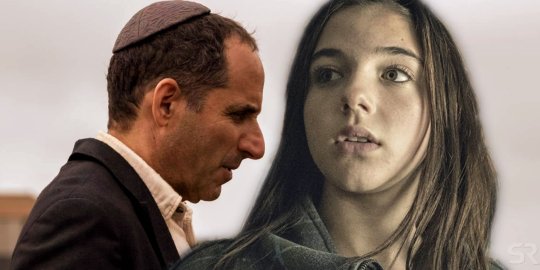
Fear the Walking Dead forgot about Charlie throughout season 5 so far, along with many other characters, and in order to bump up her screen-time, the series dedicated a huge chunk of the latest episode, "Ner Tamid", to her - except it wasn't a great episode. The first half of Fear the Walking Dead was about getting back home - to the denim factory - and the second half has been all about helping people and finding a new home. But it clearly hasn't been easy.
Traveling by convoy, Fear the Walking Dead's core group has had their ups and downs and faced their fair share of obstacles - successfully helping people who've wanted to be helped and being tricked by people who didn't want their help, as well as a mixture of both - but beyond simply being good people, they've been trying to find a place they can call home, permanently. Sure, they've come across a number of promising locations, such as a local mall stocked with food and supplies, but for whatever reason, they kept moving on.
Related: Why Cliff Curtis Left Fear The Walking Dead
Because she was tired of the convoy, Charlie left in the middle of the night to find a place for them in this week's episode, "Ner Tamid". She ended up discovering a synagogue with a rabbi living there all by himself. Everything seemed hopeful at first, but it didn't work out, which should be expected since this is still a zombie series. It was ultimately a poor ripoff of The Walking Dead's episode in which Rick Grimes found Gabriel, a priest. What's more, "Ner Tamid" was filled to the brim with standard cliches that they could've done without.
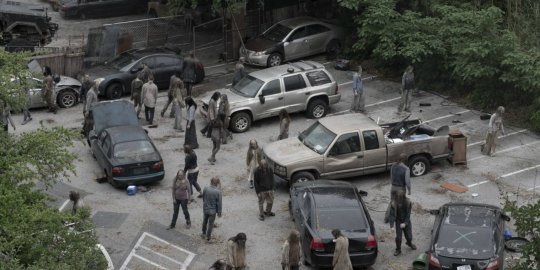
In order to instill purpose in Charlie and give her a story this season, she believed she was led to the synagogue by God and that it was the perfect location for everyone to hold up in. It's yet another instance on Fear the Walking Dead in which someone believes they have a seemingly divine purpose for doing what they're doing. It's okay in bite sizes, but the problem is that it's become a cornerstone in Fear the Walking Dead season 5.
Although it had its issues, "Ner Tamid" was still able to introduce yet another member of the Fear the Walking Dead family, a rabbi played by Peter Jacobson (House, Colony). And while the big similarity between Fear the Walking Dead's Jacob and The Walking Dead's Gabriel are that they're both religious figures for the shows - both of whom have tried to atone for what they did with to congregation - the big difference is that Jacob isn't averse to killing walkers; his only reservation was that he wouldn't use bullets on his people.
Another thing that "Ner Tamid" did was give Charlie much-needed screen-time after being side-lined throughout most of Fear the Walking Dead season 5. Next up on the list must be Luciana, who also hasn't been seen in quite some time.
Next: Fear The Walking Dead's Debunks Madison's Return Theory
source https://screenrant.com/fear-walking-dead-charlie-rabbi-episode-bad/
0 notes
Text
Top Jewish Leader Slams Israel's Ban Of Omar, Tlaib: 'Democracies Do Not Hide'
Top Jewish Leader Slams Israel’s Ban Of Omar, Tlaib: ‘Democracies Do Not Hide’

The leader of America’s largest Jewish denomination is criticizing Israel’s decision to bar two Democratic congresswomen from entering the country.
Rabbi Rick Jacobs, president of the Union for Reform Judaism, said the move to block Reps. Rashida Tlaib of Michigan and Ilhan Omar of Minnesota from visiting Israel was “wrong, full stop.”
“Democracies do not hide; they can protect their…
View On WordPress
0 notes